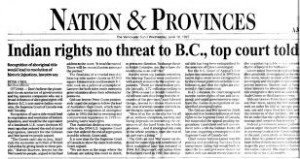 In his article about the political geography of mapping and the persistence of colonial assumptions about cartography in Canada, Matthew Sparke narrows in on the legal case involving the Gitxsan and Wet’suwet’en First Nations and their case against the BC provincial and Canadian federal governments over the recognition of their native sovereignty. While highlighting this case in order to help explain the thoughts surrounding the mapping of a nation-state and the politics surrounding this colonial endeavour, Sparke focuses on one revealing quote by Chief Justice Allen McEchern, which effectively sums up his, and the government’s, views as well as original position on native sovereignty in this case. Referring to a map of Gitsxan and Wet’suwet’en territory that was being used by both sides to argue opposite points, McEchern said that “we’ll call it the map that roared”. In an effort to dissect this statement, Sparke offers possibilities for what McEchern might have meant by saying this. In doing so he also explains what these words and this sentiment meant for the Gitsxan and Wet’suwet’en First Nations and their case for recognition of territory and sovereignty.
In his article about the political geography of mapping and the persistence of colonial assumptions about cartography in Canada, Matthew Sparke narrows in on the legal case involving the Gitxsan and Wet’suwet’en First Nations and their case against the BC provincial and Canadian federal governments over the recognition of their native sovereignty. While highlighting this case in order to help explain the thoughts surrounding the mapping of a nation-state and the politics surrounding this colonial endeavour, Sparke focuses on one revealing quote by Chief Justice Allen McEchern, which effectively sums up his, and the government’s, views as well as original position on native sovereignty in this case. Referring to a map of Gitsxan and Wet’suwet’en territory that was being used by both sides to argue opposite points, McEchern said that “we’ll call it the map that roared”. In an effort to dissect this statement, Sparke offers possibilities for what McEchern might have meant by saying this. In doing so he also explains what these words and this sentiment meant for the Gitsxan and Wet’suwet’en First Nations and their case for recognition of territory and sovereignty.
According to Sparke, McEchern’s peculiar words about the First Nations map that was being used in court “appeared to refer to the colloquial notion of a “paper tiger”, by which he meant that the map lacked substance and authority. If this interpretation is correct, McEchern’s words worked to diminish the significance of an important map, which outlined Gitsxan and Wet’suwet’en territory. By stating, in his opinion, that the map and such cartographic tools would not withstand a serious challenge by the defense in this case, McEchern offers up his colonialist opinion regarding the recognition of native sovereignty.
Sparke offers a second possibility for what Chief Justice McEchern may have meant by declaring “we’ll call it the map that roared”. He says that McEchern may have been referring to the Cold War movie The Mouse that Roared, starring Peter Sellers, in which “an impoverished backward nation declares war on the United States of America, hoping to lose” (imdb). In an offensive attempt to draw a parallel between this satirical film and the efforts of the Gitsxan and Wet’suwet’en to have their native sovereignty recognized, McEchern again demonstrates a lack of respect that is rooted in colonialism and white supremecy. A further reading into this interpretation might even underline McEchern’s implication that the Gitsxan and Wet’suwet’en were trying to lose the court case. As Sparke says, McEchern may have been “referring to the plaintiffs as a ramshackled, anachronistic nation” when he referenced the “map that roared” (Sparke).
Sparke makes clear that as a result of his “we’ll call it a map that roared” statement, Chief Justice McEchern systematically dismissed the Gitsxan and Wet’suwet’en First Nations claims “ with an absolutist set of colonialist claims about the extinguishment of aboriginal rights” (Sparke)”. He goes on to explain that McEchern’s statement emphasized the fact that the Gitsxan and Wet’suwet’en First Nations were working within the prejudicial framework of Canadian colonial law that decided to ignore their agency, territorial claims, and native sovereignty.
Works Cited:
“Indian Rights No Threat to B.C., Top Court Told”. The Vancouver Sun 18 June 1997. upperskeena.ca. Web. 3 March 2014
Santoro, Amy. “Gitsxan and Wet’suwet’en Decision Could Have Disastrous Effects”. Aboriginal Multimedia Society 1991:1. Web. 3 March 2014
Sparke, Matthew. “A Map That Roared and an Original Atlas: Canada, Cartography, and the Narration of Nation.” Annals of the Association of American Geographers 88.3 (1998): 463-495. Print
“The Mouse that Roared”. imdb.com. N.p., n.d. Web. 3 March 2014.
“The Project”. Historical Atlas of Canada: Online Learning Project. N.p., n.d. Web 3 March 2014
